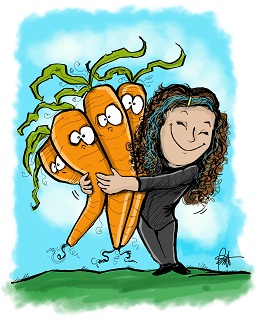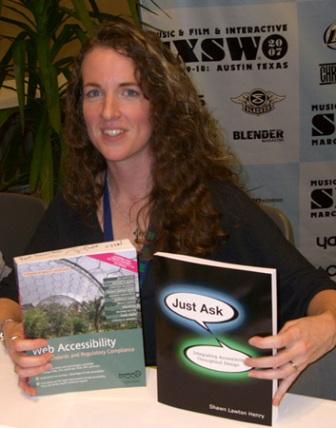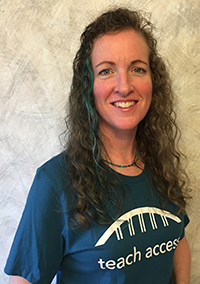About Shawn
Shawn Henry focuses her personal passion for accessibility on bringing together the needs of individuals and the goals of organizations in designing human-computer interfaces.
- Shawn leads worldwide education and outreach promoting web accessibility for people with disabilities at the W3C Web Accessibility Initiative (WAI), through MIT.
- TAdER Project provides research and outreach to better understand users' needs to customize text for readability — specifically, people with low vision, dyslexia, and related conditions that impact reading, including older people.
- Just Ask: Integrating Accessibility Throughout Design book, which is available free online, offers an approach for developing products that are more usable for everyone.
- Shawn
[More bio info: Shawn Lawton Henry at W3C WAI and Bio blurbs and photos for conference programs, list of Publications.]
NOTE: Please be careful in referencing information from www.uiaccess.com and www.tader.info websites and e-mails as from the individual Shawn, not associated with her employer.
Pronouns/Gender/Sex: I'm female. Female since birth. "cisgender" = born female, "identify" as female. (though not sterotpyical in several ways) Female pronouns are important to me. And, I've started using 'Shawna' for some of my online accounts to help make more clear that I'm female.
Some basics
- The best way to reach me is call
 +1-617-395-7664
+1-617-395-7664
or IRC: Channel: #shawn; Server: irc.w3.org; Port: 6665 (in mibbit Server address: irc.w3.org:80)
 W3C e-mail: shawn@w3.org
W3C e-mail: shawn@w3.org
 personal e-mail: shawn@uiAccess.com
personal e-mail: shawn@uiAccess.com
- I am available for select speaking, training, usability testing, and research projects. I'm not available for consulting on web accessibility to an individual organization.
I'm employed part-time by MIT for W3C WAI in order to leave flexibility to do other projects (that do not have potential conflict of interest or such).
 I'm all about embracing the carrots!
I'm all about embracing the carrots!
What I hope
In an interview (video online), I was asked: "Could you tell us your hope for web designers or developers like us in the world, not only in Japan? Even if it's not related to, not only specifying the accessibility issue. What do you hope?" Here's what I said:
I hope that web designers and developers would understand the importance of accessibility, and how when the Web is accessible it is amazingly empowering to individuals with disabilities, and also to society as a whole.
I hope that developers and designers would be very challenged in their work, and would see their work in developing the Web as exciting. And when they come upon a problem, to embrace the challenge and come up with a solution, and feel very rewarded by the solution.
I hope that web designers and developers would understand that they can change the world through their work. And that they would develop the Web so that they can use it and contribute to it now and in the future, whether or not they have a disability.
How I got into accessibility
I was also asked: "Could you tell us about yourself, for example, your background and current job?" Excerpts:
My educational background is in computer science and English, technical communications. My early jobs were in user interface design. I was working for a large organization at first and then a small organization, consulting to various companies...
Then I had some health problems. I began to have difficulty using the computer because of vision and physical problems. I didn't think I was going to be able to continue to work. Then I discovered accessibility and the Trace R&D Center.
And so I decided to do something about accessibility.
So my getting into accessibility was somewhat self serving at first. But even after I began to get better, I was very passionate about accessibility -- after I understood how important it is to peoples' lives.
...When the W3C WAI education and outreach position became available, I felt that was the best way for me to be able to contribute to the field of accessibility on a worldwide scale.
Misc tidbits
- I am deeply saddened by much of societies' views of people with disabilities. So many people miss out on interactions and relationships because they don't see past disability to the person.
- I love water. I have a sea kayak and a handmade wood strip canoe. We live on the Yahara River Lakes and can paddle for hours from our house. I like to paddle different places around the world.
- About my name: My first/given name is based on one of my grandmother's names. I use all 3 parts of my name ('Shawn Lawton Henry') for publications, and 2 names ('Shawn Henry') for informal stuff.
- The white streak in my hair is natural, God-given. It appeared in my late 20s. (Back then I was consulting and training to mostly older clients and I used to put my hair in a twist/bun and pull the white streak out so it looked like I had gray hair and was older... I don't do that anymore.) [update: At a youth group retreat, I let teenagers dye it teal. I might keep it that way for a while...]
- I don't blog, for many varied reasons I won't go into here. Sometimes I want to share blog-like bits, but not enough to cut out other stuff from my life to make the time to do it.
- A photo from 2007 SXSW book signing:

- (I tend to use lots of parenthesis in my writing—and em dashes, and also ellipsis... although I try to limit them. :) I think that's because I naturally use lots of body language and intonation to communicate, which I can't fully express in writing—which is why I prefer in-person communication...
